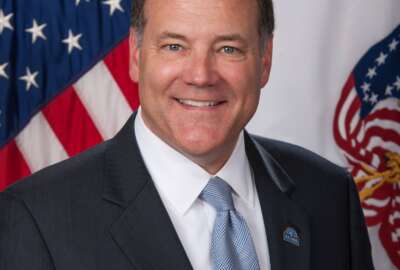A former top human resources executive at the Department of Veterans Affairs improperly steered a contract to benefit two of his friends, the agency’s inspector general found in a recent report.
Peter Shelby, who briefly served as VA’s assistant secretary for human resources and administration, violated ethics laws and abused his position to award a $5 million contract to two friends.
The contract “resulted entirely in waste,” James Mitchell, VA’s acting assistant inspector general, said.
The contract was for leadership development and training for VA employees and applicant assessment tools. Shelby was friendly with the owner of the service-disabled veteran-owned small business that received the $5 million contract. He was also friends with the vice president of Blanchard, one of the subcontractors on the project, who had endorsed Shelby for the assistant secretary position back in 2017.
According to the IG, Shelby directed his staff to pursue a contract with the small business under a specific VA sole-source authority, which allows the department, under limited circumstances, to avoid the usual competitive bidding procedures. But in this case, those authorities were misused to benefit Shelby and the preferred small business, the IG said.
“According to Strategic Acquisition Center staff, Mr. Shelby was insistent and intimidating in communicating his request that the contract be awarded to the Small Business. The contracting officer described Mr. Shelby as ‘completely unprofessional and just yelling and ranting and raving that he had to have this company,'” the IG said.
VA contracting and procurement were skeptical of sole sourcing leadership development training, the IG said, because many vendors offered such services. Preliminary market research showed multiple vendors could provide such training, including at least four other service-disabled veteran-owned small businesses (SDVOSBs).
“Staff were aware and advised Mr. Shelby that, for a sole-source acquisition under [statute], VA policy required the contracting officer to establish that only one SDVOSB was capable of accomplishing the requirement,” the IG said.
Multiple VA contracting officers attempted to persuade Shelby to compete the requirement, but he insisted on using a sole-source approach. While top VA procurement officials and competition advocates acknowledged VA had this particular authority that, in certain circumstances, allowed them to skip traditional competitive bidding, they used the sole-source authority sparingly.
Eventually, VA staff signed off the contract to the preferred small business after a conference call with Shelby — and after receiving approval from general counsel officials.
The sole-source justification also relied on flawed market research, the IG said. While VA contracting staff found other SDVOSBs for leadership development training, market research documents don’t reflect whether a similar effort was made to find vendors that could provide talent assessment services.
“The human resources and administration program director told OIG investigators that ‘what made this unique was the talent acquisition piece combined with the leadership development, there was no other small business that could do it. So when you put the two requirements together instead of separate, then you couldn’t find anyone else that could do it, so that’s how you could legally justify the sole source,'” the IG report reads. “Thus, in this instance, the sole-source justification relied on the combination of two independent requirements (leadership training and talent assessment) that could have been acquired under separate contracts.”
The IG found no evidence to suggest VA had studied whether consolidating these two contract requirements was in government’s best interest.
It also found no evidence that anyone had truly questioned whether Shelby was steering the contract for his own personal gain, despite warnings from a VA contracting officer and the senior procurement officer, who had raised red flags about the sole-source approach.
Not only did the $5 million award result in a contract that VA couldn’t use, the department also purchased more services than it really needed, the IG said. The $5 million contract covered training licenses for 17,000 VA employees, but only 232 people at the department had access to the in-person or online training.
The IG made eight recommendations to VA about this contracting matter; the department agreed with all of them. The IG also referred the matter to the Justice Department, which declined to open an investigation.
Shelby worked for VA for a little more than a year. He left in 2018 to “pursue opportunities in the private sector,” Peter O’Rourke, the department’s then-acting secretary, told Federal News Network at the time.
According to the IG, Shelby left in 2018 after learning that he’d been recommended for removal for reasons unrelated to his handling of the small business contract.
During his tenure, Shelby focused on reorganizing and consolidating VA’s 170 human resources offices, part of a larger initiative to shrink its HR function of 7,000 employees in half over the next several years. He closed VA’s HR function at the department’s central office in an effort to move the agency’s customer-serving organizations closer to the people they serve.
Shelby was also behind VA’s new performance management guidance, which the agency issued after receiving new authorities in the accountability act. That guidance has earned mixed reviews from both employees and members of Congress.
Copyright
© 2024 Federal News Network. All rights reserved. This website is not intended for users located within the European Economic Area.

